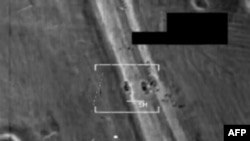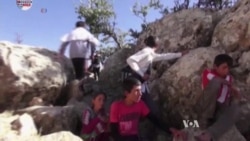The U.S. military says it carried out four more airstrikes against Islamic State militants in northern Iraq who were firing on civilians.
The U.S. Central Command said Saturday's strikes involved jet fighters and drones and targeted armored carriers and a truck. It described the strikes near Sinjar as successful.
Earlier Saturday, President Barack Obama announced that U.S. military airstrikes in Iraq successfully destroyed arms and equipment that Islamic State militants could have used against the Kurdish capital of Irbil.
Speaking at the White House, Obama said the fight against the group previously known as the Islamic State of Iraq and the Levant (ISIL) will take "more than weeks," and that recent strikes are essential to prevent the militants' advance on Irbil, where American diplomats and military advisers, among others, are stationed.
Obama said the intervention was also needed to aid Iraqi religious minorities, including Christians and Yazidis, who fled after the extremist Sunni militants issued an ultimatum ordering groups of civilians to convert to Islam or die. The extremist militia has published videos of its adherents beheading people who fail to comply with such orders.
On Saturday, Obama also said food and water air-dropped by the U.S. military to the civilians stranded on Mt. Sinjar "will help them survive."
"Humanitarian effort continues to help the men, women and children," he said, adding it may take time to provide safe passage for those on the mountain.
The president said the U.S. has also stepped up military assistance to Kurdish forces in Iraq.
According to statements released by the White House, leaders of both Britain and France have agreed to join the United States in providing help to the refugees, and that on Saturday Obama and British Prime Minister David Cameron agreed to develop options to secure the civilians' safety.
The White House also said Obama and French President Francois Hollande agreed on the need for an "urgent, coordinated international response to the humanitarian disaster." The two leaders said they would work together on a longer term strategy to counter the Islamic State group.
The crisis in Iraq has been at the top of the agenda for the U.S. government for much of the past week. In his weekly address to the nation, broadcast earlier Saturday, the president said he decided to intervene in Iraq because the U.S. "cannot just look away" when "innocent people are facing a massacre."
After speaking with reporters on the South Lawn, Obama departed Washington to begin his vacation in the northeast state of Massachusetts.
Iraqi government
The president also told reporters the most important timetable he is focused on is the formation of an inclusive Iraqi government, so that Iraqis can unite to defend their country from the Islamic State fighters who currently hold large portions of Iraqi territory.
Iraq's parliament was elected in April but still must choose its leadership. Support has been waning for Prime Minister Nouri al-Maliki, a Shi'ite criticized for not involving representatives of other religious and ethnic groups.
A parliamentary session to select a prime minister-designate that was scheduled for Sunday has been postponed until Monday. According to reports by Iraqi media, confusion among Shi'ite political leaders over the choice of a new prime minister had prompted the move. The delay has breached a 15-day constitutional deadline for naming a new prime minister.
Clashes near Irbil
According to White House officials, in one recent strike, the U.S. military dropped 250-kilogram laser-guided bombs on an artillery unit that was shelling Kurdish forces defending Irbil.
According to witnesseses on the ground, Kurdish Peshmerga fighters succeeded in rescuing hundreds of the stranded Yazidi refugees, apparently holding Islamic State militants along a defensive line approximately 50 kilometers south of the Kurdish capital.
Bakhtyar Dogan, a spokesman for the armed wing of the Kurdistan Workers’ Party, the People's Protection Forces, told VOA Kurdish Service on Saturday that Islamic State militants had been marching on Irbil.
“The militants are close to a refugee camp on the outskirts of Irbil," he said. "It poses a serious threat. We are fighting back to protect our people, especially women, elderly and children. There were several clashes yesterday between our fighters and the militants.”
Retired U.S. Brigadier General Ernie Audino told VOA Kurdish that the United States should strengthen Kurdish forces to effectively fight the Islamic State.
“I believe that we need to arm the Kurds, support the Kurds in a way that will allow them to maintain and exploit the conditions on the ground and we can set with a legitimate air campaign coordinated with Peshmarga operations on the ground.”
The U.S. airstrikes and the promise of further help by U.S. President Barack Obama appear to have left some Iraqi leaders optimistic.
Fouad Hussein, the Chief of Staff to the Presidency of the Kurdistan Regional Government, told reporters Saturday that his men have been fighting an uphill battle against the Islamic State militants, but have now started to regain a sense of initiative in the wake of U.S. support.
Iraqi leaders thanked U.S. forces for the targeted airstrikes and for air-dropping relief packages for the stranded refugees.
"We are most grateful and express our gratitude and deep, deep appreciation for President Obama and the U.S. administration, and for the courageous U.S. Army and airmen who are now patrolling the skies of Iraq and Iraqi Kurdistan," said former Foreign Minister Hoshyar Zebari, an ethnic Kurd.
Zebari's comments echoed similar sentiments expressed by Iraqi President Fouad Massoum, who also called the strikes crucial to the counter-insurgency.
The Islamic militant group, which has captured significant amounts of military hardware the U.S. had previously supplied Iraqi forces, now controls a large swathe of eastern Syria and northwestern Iraq. It has declared the area a "caliphate," and is actively recruiting other fighters to join the group.
Refugee crisis
In Washington on Friday, U.S. Deputy National Security Advisor Ben Rhodes met at the White House with members of the Yazidi community to discuss the situation in northern Iraq and said the United States will continue to provide humanitarian support.
According to Iraqi news media reports, Louis Sako, the Chaldean Catholic archbishop of Kirkuk, met with Iraq's top Shi'ite religious cleric, Ayatollah Ali Sistani, at his home in Najaf, where both men urged the world to help alleviate the refugee crisis and insisted that all Iraqis, including Ayatollah Sistani, were united in combating the militants.
According to Sako, more than 100,000 Christians have fled the region surrounding Mosul.
The International Organization for Migration says the number of internally displaced people in Iraq now exceeds 1 million.
VIDEO: US Airstrikes Raise Hopes, Stakes in Iraq:
VOA reporter Kokab Farshori and White House correspondent Luis Ramirez contributed to this report. Ed Yeranian contributed reporting from Cairo.







